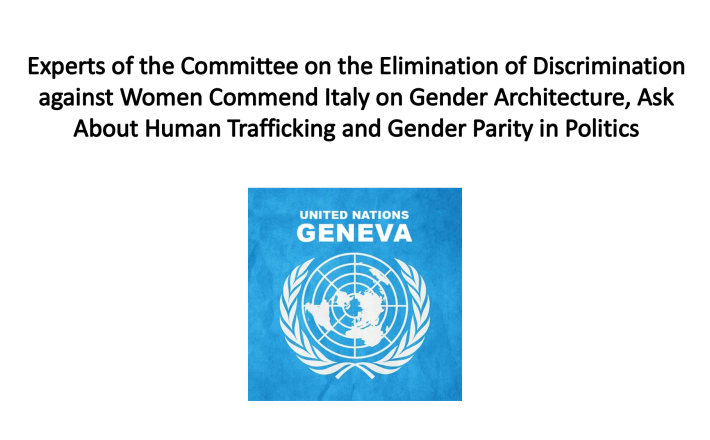Experts of the Committee on the Elimination of Discrimination against Women Commend Italy on Gender Architecture, Ask About Human Trafficking and Gender Parity in Politics
Source: United Nations Geneva
The Committee on the Elimination of Discrimination against Women today reviewed the eighth periodic report of Italy, with Committee Experts commending the State on its robust gender architecture, while asking questions about human trafficking and gender parity in politics.
A Committee Expert commended Italy on its gender architecture, which was in accordance with the Convention. The gender architecture was composed of the Ministry of Equal Opportunities, the Department on Equal Opportunities directly linked to the Prime Minister, and the Inter-Ministerial Committee on Human Rights. The political and institutional structure was robust but complex.
Another Committee Expert said Italy was at the forefront of the reception of refugees. Many women were trafficked during several parts of their journey. How did the State party guarantee these women’s access to protection in all circumstances? Were non-governmental organizations permitted to run interviews with trafficked persons to assist them? How was individualised risk assessment conducted before forced removals? How would the State party implement a referral and identification process throughout Italy and strengthen the capacity of the reception system?
One Expert regretted the slow progress made by Italy regarding political representation. The 2017 electoral law imposed a 40 per cent quota on electoral lists. However, these rules were not respected. There were fewer female members of parliament in this term, compared to the previous one. Why was there not a fifty-fifty parity? What measures did the State party plan to take to encourage parity at all levels? How many standing committees in parliament were chaired by women?
Click here to read the full article published by the United Nations Geneva on 1 February 2024.

The Committee on the Elimination of Discrimination against Women today reviewed the eighth periodic report of Italy, with Committee Experts commending the State on its robust gender architecture, while asking questions about human trafficking and gender parity in politics.
A Committee Expert commended Italy on its gender architecture, which was in accordance with the Convention. The gender architecture was composed of the Ministry of Equal Opportunities, the Department on Equal Opportunities directly linked to the Prime Minister, and the Inter-Ministerial Committee on Human Rights. The political and institutional structure was robust but complex.
Another Committee Expert said Italy was at the forefront of the reception of refugees. Many women were trafficked during several parts of their journey. How did the State party guarantee these women’s access to protection in all circumstances? Were non-governmental organizations permitted to run interviews with trafficked persons to assist them? How was individualised risk assessment conducted before forced removals? How would the State party implement a referral and identification process throughout Italy and strengthen the capacity of the reception system?
One Expert regretted the slow progress made by Italy regarding political representation. The 2017 electoral law imposed a 40 per cent quota on electoral lists. However, these rules were not respected. There were fewer female members of parliament in this term, compared to the previous one. Why was there not a fifty-fifty parity? What measures did the State party plan to take to encourage parity at all levels? How many standing committees in parliament were chaired by women?
Click here to read the full article published by the United Nations Geneva on 1 February 2024.